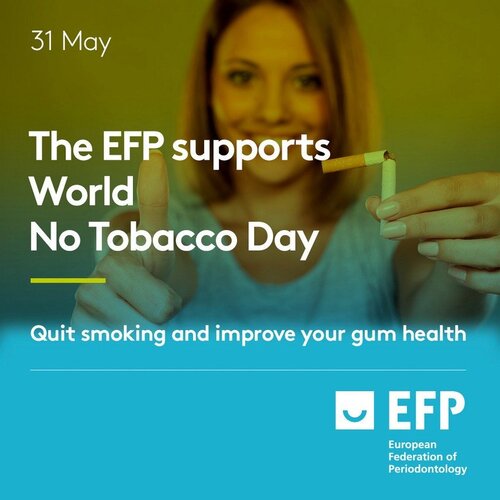![]()
31 May 2019
World No Tobacco Today: EFP highlights importance of smoking cessation to periodontal health
Categories:Clinical Practice, Communication, New Classification

Today (May 31) is World No Tobacco Day, an international awareness initiative driven by the World Health Organization.
This annual campaign seeks to raise awareness on the harmful and deadly effects of tobacco use and second-hand smoke exposure, and to discourage the use of tobacco in any form.
While the overall focus of this year’s event is the negative impact of smoking on people’s lung health (from cancer to chronic respiratory disease), there are other many other negative impacts from smoking.
The EFP marks the occasion of World No Tobacco Day by issuing a reminder of the role that smoking plays in periodontal and peri-implant disease.
Smoking is a major risk factor that can worsen gum disease and negatively affect the health of dental implants.
The role of tobacco use is made clear in the new classification of periodontal and peri-implant diseases and conditions, which is being promoted by the EFP.
As the guidance note on periodontitis in the EFP toolkit for clinicians on the new classification explains: “Current evidence supports multifactorial disease influences – including smoking – on multiple immunoinflammatory responses. This makes dysbiotic microbiome changes more likely for some patients than for others and may well influence the severity of disease for such individuals.”
When it comes to grading a periodontitis case, grades will be modified if the patient smokes. A patient who smokes 10 or more cigarettes a day will be changed to Grade A to Grade C, while one who smokes fewer than 10 cigarettes per day will be changed from A to B.
The grading of cases – a key aspect of the new classification – provides supplemental information about biological features of the disease including a history-based analysis of the rate of periodontitis progression, assessment of the risk for further progression, and an analysis of possible poor outcomes of treatment.
Smoking can also play a role in non-plaque-induced periodontal diseases, such as necrotising gingivitis, necrotising periodontitis, and necrotising stomatitis. It can also cause “smoker’s melanosis”, a change to the pigmentation of the gingiva.
Effect on implants
At EuroPerio9 in Amsterdam in June 2018, a large-scale study of 20,000 dental implants was presented, showing that smoking had a negative effect on implant success.
Researcher Bernhard Pommer (Academy of Oral Implantology, Vienna, Austria) explained that “smoking deteriorates long-term implant success in all groups, except in young periodontally healthy patients. On the contrary, in younger patients (less than 40 years of age) with a history of periodontal disease, smoking had a big impact, with a 5.5-fold increased risk of failure, compared to young healthy individuals.”
Dr Pommer added that, with these results at hand, dentists and periodontitis can inform patients about the consequences of smoking on the success of their implants.
Cessation counselling
Among the benefits of giving up smoking are that, for the periodontal patient, this can lead to better healing after periodontal treatment.
In recent years, the EFP and its member societies have been highlighting the role that can be played by periodontists in encouraging their patients to give up smoking.
Research suggests that tobacco-use cessation through brief interventions in the dental clinic can be effective and lead to improvements in people’s oral health.
The Spanish Society of Periodontology and Osseointegration (SEPA) marked European Gum Health Day 2018 with the launch of a 48-page report on tobacco cessation and oral health, which it prepared with Spanish National Committee for the Prevention of Tobacco Use (CNPT).
This report combines technical aspects aimed at professionals and practical features focused especially on patients. It offers guidance on how tobacco use can be tackled within the dental practice and various strategies and simplified protocols that can help patients who want to give up smoking.




